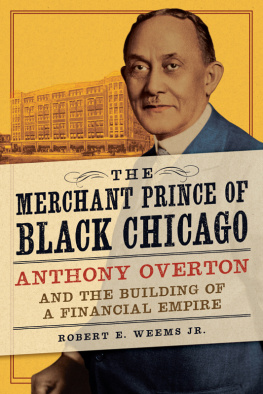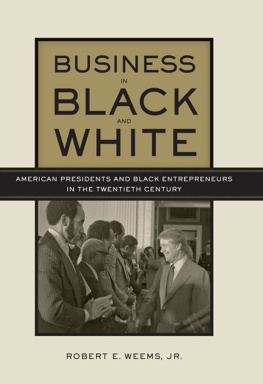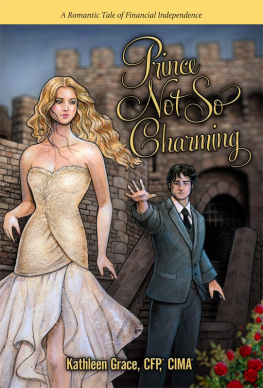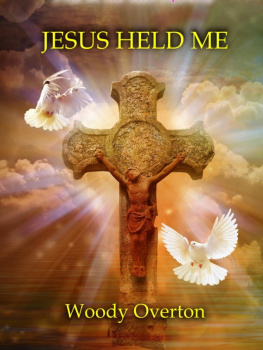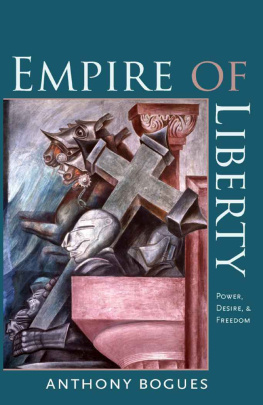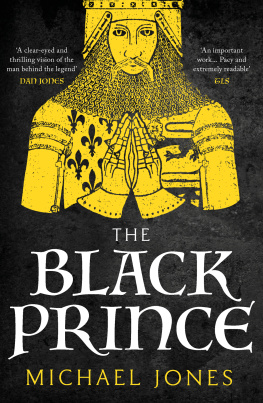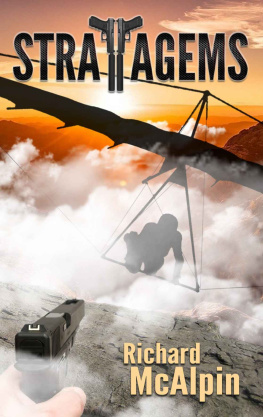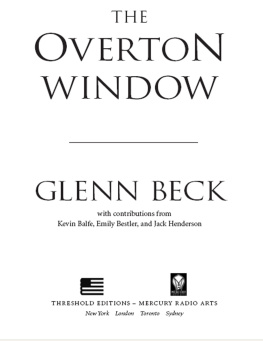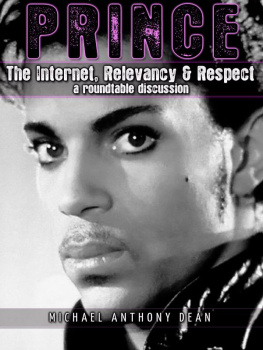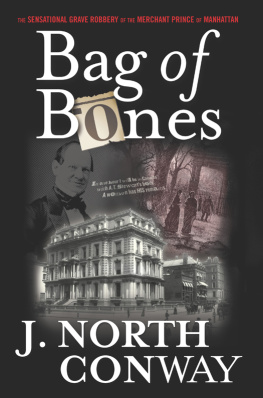2020 by the Board of Trustees
of the University of Illinois
All rights reserved
Publication of this book was supported by funding from the Department of History at Wichita State University.
Library of Congress Cataloging-in-Publication Data
Names: Weems, Robert E., 1951 author.
Title: The merchant prince of Black Chicago : Anthony Overton and the building of a financial empire / Robert E. Weems Jr.
Description: Urbana : University of Illinois Press, [2020] | Includes bibliographical references and index.
Identifiers: LCCN 2019032957 (print) | LCCN 2019032958 (ebook) | ISBN 9780252043062 (cloth) | ISBN 9780252084935 (paperback) | ISBN 9780252051920 (ebook)
Subjects: LCSH: Overton, Anthony, 1946. | African American businesspeopleIllinoisChicagoBiography. | African American capitalists and financiersIllinoisChicagoBiography. | African American business enterprisesHistory20th century.
Classification: LCC HC102.5.O88 W44 2020 (print) | LCC HC102.5.O88 (ebook) | DDC 338.092 [B]dc23
LC record available at https://lccn.loc.gov/2019032957
LC ebook record available at https://lccn.loc.gov/2019032958
This book is lovingly dedicated to the memory of Dolores J. Weems, my mom and #1 fan.
Acknowledgments
This biography of the African American businessman Anthony Overton could not have been produced without the assistance and support of a wide variety of institutions and individuals. First, I want to thank my former employer, the University of MissouriColumbia, and the University of Missouri Research Board, for providing the financial support to conduct my initial research on Anthony Overton. This funding allowed me to gather information related to Anthony Overtons first forty-seven years of life on research trips to Monroe, Louisiana; Topeka, Kansas; Oklahoma City/Kingfisher, Oklahoma; and Kansas City, Missouri. The following local libraries and repositories were especially helpful: Ouachita Parish [Louisiana] Public Library, Special Collections; University of LouisianaMonroe Library, Special Collections; Kansas Historical Society; University Archives, Mabee Library, Washburn University; Topeka & Shawnee County Public Library, Special Collections; Oklahoma Historical Society; Kingfisher Memorial Library, Special Collections; Kansas City, Missouri Public Library, Special Collections. In addition, funds from the University of Missouri Research Board underwrote a research trip to Harvard Universitys Baker Library, where I examined pertinent historic Dun & Bradstreet reports. Finally, in terms of my research related to Anthony Overtons formative years, I want to thank Letha Johnson and Deborah L. Dandridge, archivists at the University of Kansas, for their assistance in helping me establish the contours of his aborted matriculation there in the 1880s.
Anthony Overtons 1911 move to Chicago proved to be an extremely profitable decision. During his subsequent years in the Windy City, he evolved from a moderately successful entrepreneur into a literal tycoon. My receipt of a 2010 Summer Fellowship from the Black Metropolis Research Consortium (BMRC), based at the University of Chicago, provided me the opportunity to do in-depth research in the city where Anthony Overton truly made his mark as a businessman. As a BMRC Fellow, I was able to collect data from the following repositories: Regenstein Library, University of Chicago, Special Collections; Vivian Harsh Collection, Carter G. Woodson Regional Library; National Archives; Chicago History Museum (Claude A. Barnett Papers); and the Christopher R. Reed Collection at Roosevelt University. Not only did I have the opportunity to consult Christopher Reeds papers, but he also graciously granted me his own time. Reed, who served as a consultant to the BMRC, is regarded as this generations leading historian of black Chicago. His ongoing encouragement and support have been much appreciated. Two other colleagues associated with my experience with the BMRC that I want to acknowledge are historian Adam Green of the University of Chicago and Tamar Evangelista-Dougherty, who served as the Black Metropolis Research Consortiums archivist consultant. Tamar helped me understand that it is not unusual for companies to destroy their records when they cease operations. Finally, I want to acknowledge the assistance of Bea Julian, the former archivist at the BMRC partner DuSable Museum of African American History. Through her intercession, the Papers of Olive Diggs (Diggs was the editor of the Overton-controlled Chicago Bee newspaper), were subsequently made available to me.
I also want to thank my current employer, Wichita State University, and particularly the College of Liberal Arts & Sciences (LAS). Besides helping to underwrite research trips to Lawrence, Kansas, Chicago, the Louisiana State Archives in Baton Rouge, and the Library of Congress, LAS also hosted and promoted public lectures related to my Anthony Overton research. Developing the following four presentations: The Making of an African American Tycoon: Anthony Overtons Business Activities, 19151925; The Merchant Prince of his Race: Anthony Overtons Business Conglomerate during the 1920s; What Goes Up, Must Come Down: Anthony Overton and the Great Depression; and Whatever Happened to Anthony Overton? The Final Years and Legacy of a Noteworthy African American Entrepreneur helped me to better conceptualize the contours of this individuals life and career.
Although this biography focuses on Anthony Overtons business activities, it also discusses aspects of his personal life. My desire to tell this part of Overtons story benefited immeasurably from the openness with which his descendants met my requests for information. An extended personal interview with Sheila Overton-Levi, Anthony Overtons granddaughter, generated a wealth of information regarding this complex man. Also, Sheila helped put me in touch with other descendants of Anthony Overton: Sharon F. Patton, Sheila Green, Emily Bates, and Sandra Jones. In addition, Sharon, Emily, and Sandra shared with me priceless family pictures that are reproduced in this book (along with one from another relative, Martha Harriet Bryant). Another member of the Overton family tree, Dr. James Overton, shared information regarding Anthony Overtons family lineage. He has conducted painstaking genealogical research related to Anthony Overtons father, Anthony (Antoine) Overton Sr. Finally, Frank Overton, the grandson of Anthony Overtons older brother, Mack Wilson Overton, shared with me pertinent information regarding his grandfather, who was also an entrepreneur.
As with many entrepreneurs, including his father, Anthony Overtons children participated in his business activities. This included sons-in-law Dr. Julian Lewis and Richard Hill Jr., Esq. In this regard, I want to extend a special thanks to Robert Branch II, who has conducted extensive research on Lewis. Over the years we have shared information about our respective projects. Also, he and Dr. James Overton are collaborating on a family history that links the black and the white Overtons. In addition, thanks are due to Ross Slacks, the executive director of the Northeast Louisiana Delta African American Museum (whom I met through Robert Branch II) for granting me permission to reproduce here an oil painting of Anthony Overtons father.
Personal interviews were not a major part of the research methodology for this biography. Nevertheless, apart from my discussions with Overton descendants and relatives, four others stand out as having provided interesting and helpful information. Tim Samuelson, the cultural historian of the City of Chicago, who in the 1980s spearheaded the subsequent renovation of the historic Overton Hygienic Manufacturing Building and the Chicago Bee Building. Harold Lucas, a business-minded community activist in Chicago, not only worked with Samuelson regarding the restoration of Anthony Overtons black Chicago commercial structures, but he has also worked to mobilize support for the revitalization of Chicagos entire historic Bronzeville district. Robert Howard, a member of the Black Chicago History Forum, shared information with me about the relationship between Anthony Overton and fellow black Chicago banker Jesse Binga. Centenarian Timuel Black, the griot of black Chicago, knew Anthony Overton and provided important insights about Overton and his legacy. I thank you all most sincerely for your time and assistance.


